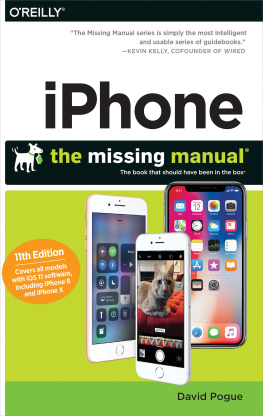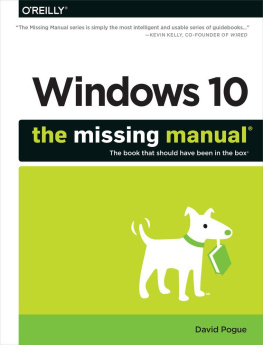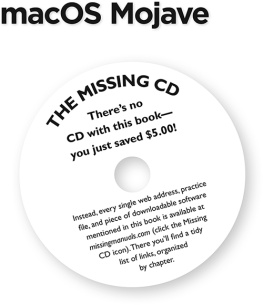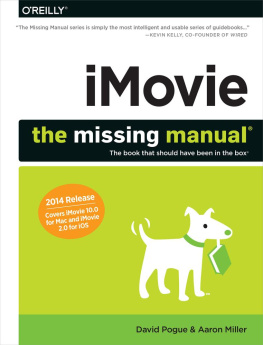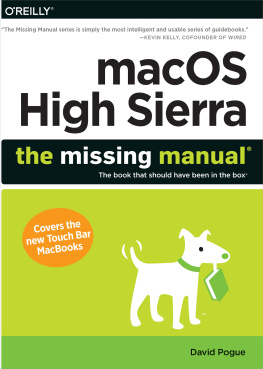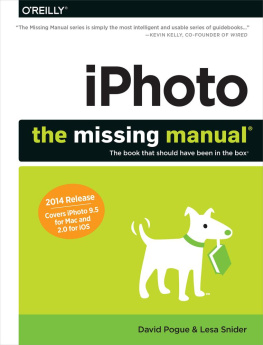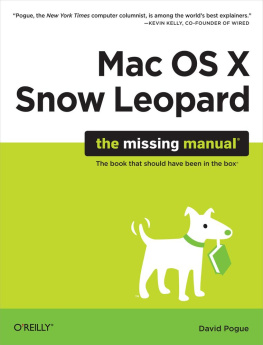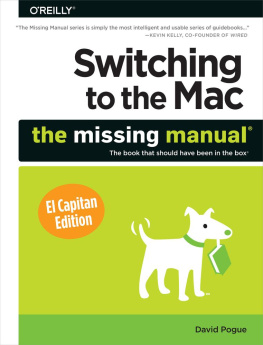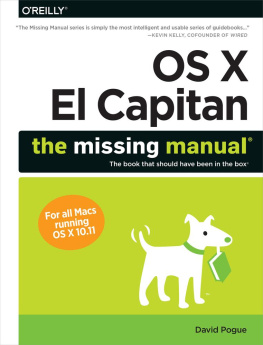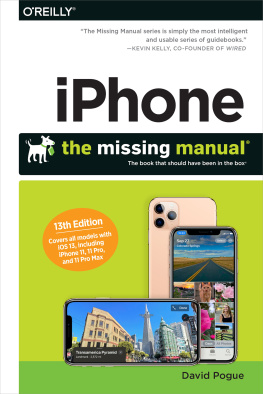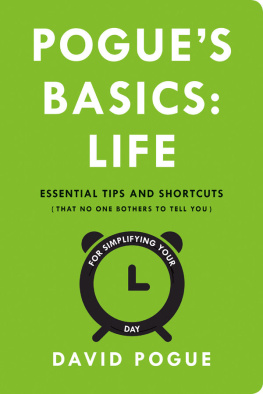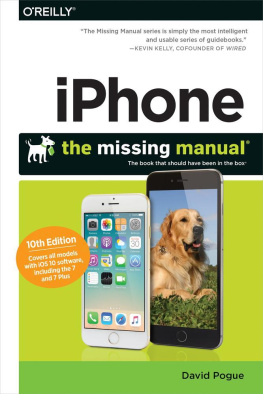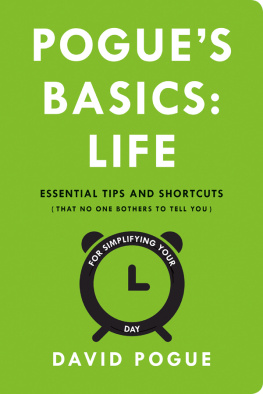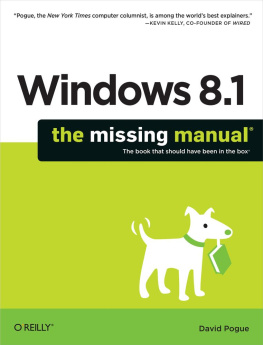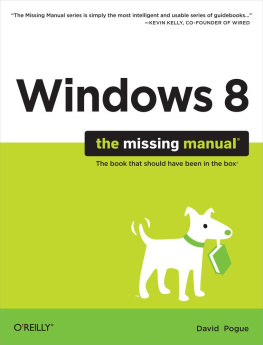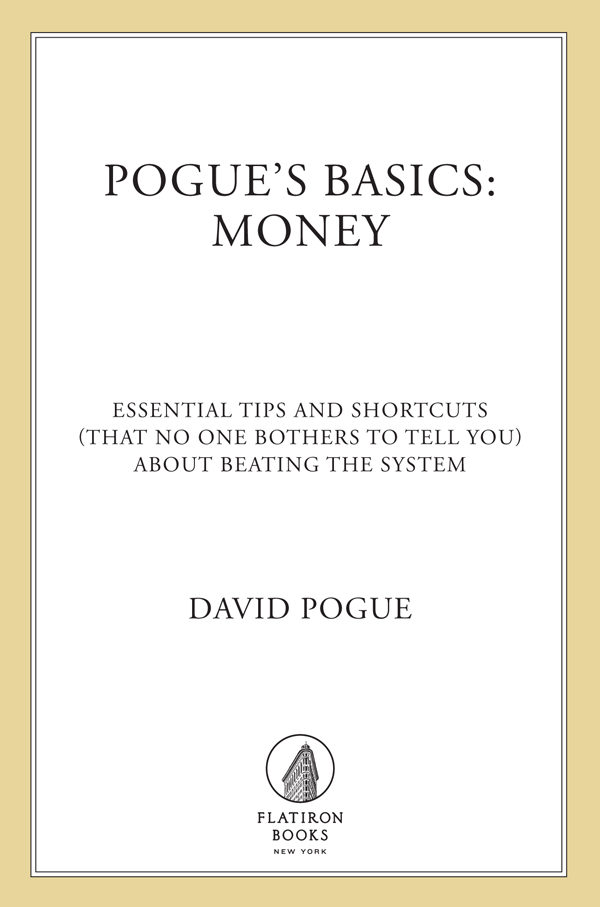Contents
Guide

The author and publisher have provided this e-book to you for your personal use only. You may not make this e-book publicly available in any way. Copyright infringement is against the law. If you believe the copy of this e-book you are reading infringes on the authors copyright, please notify the publisher at: us.macmillanusa.com/piracy.
For the people whove
taught me the basics:
Nicki, Kell, Tia, Jeffrey,
Mom and Dad,
and Twitter
Every single person on earth would like more money.
If you think youre the exceptionif you think you have too much moneyits easy to get rid of some. The rest of us will be happy to help you out there.
The question is: How do you get more money?
Well, youve probably heard the old saying Time is money. And, yes, thats true. You can usually spend time to get money. By working, by learning a new skill, by looking for coins on the sidewalk.
But heres the problem with that Time is money thing: Time is also limited! You cant snap your fingers and have more of that, either.
So thats just great: Wed like more money, but to get it, we have to spend something else we dont have enough of?
You know what else is money, though? Information. If you know certain things, you can get more money without spending time.
As it turns out, the world is filled with little bits of information that can save you money or make you money. Theres hardly a single area of life that doesnt harbor money-saving secrets. Cars, homes, hotels, planes, restaurants, clothing, hospitals, credit cards, insurance, taxes, movies If you knew the ins and outs of every industry, youd be a money genius.
You can probably see where all of this is going: to this book. Its purpose is to hand those secrets to you on a silver platter, so you dont have to scrounge for that precious information yourself. I guess you could say this book is designed to save you time and money.
The birth of this book
Ive spent most of my career writing about technology and science. Why am I suddenly writing a book about money?
The answer is simple: I have a character flaw. I cannot stand things that are inefficient, sluggish, or poorly designed. My brain spends its spare cycles silently finding loopholes, shortcuts, and better ways in every corner of life. I pick up life hacks the way another middle-aged man might memorize baseball stats.
When I see someone doing something the long way, I cant keep my mouth shut. I step forward, invading the privacy of total strangers, and demonstrate the better way. Thats just the kind of helpful guy I am.
On one hand, this trait subjects me to the mockery of my wife and kids, who call me Mr. Shortcut (and not with the admiring tone you might expect). I often marvel that, for example, in 2016, were still fastening our sneakers and running shoes using the ancient and clumsy tying-shoelaces method; my kids roll their eyes.
On the other hand, when I put together a book of technology shortcuts (the first Pogues Basics book), I struck a chord. Apparently a lot of people feel overwhelmed by the featuritis of todays electronics.
I followed that with a second book, Pogues Basics: Life. This time, I broadened my scope beyond technologyto everyday life. Traveling, cooking, clothing, shopping, driving, staying healthy.

And now, in your hands, you hold the inevitable Sequel to the Sequel.
Im particularly proud of this baby. Ive been a consumer advocate my entire life, constantly on the lookout for scams, overpricing, and psychological manipulations. I share my insights with anyone wholl listen. For me, the opportunity to lay them bare to a wider audience is pure gold.
I also asked my Twitter followers to share with me their own hard-won money-saving tips. Youll find some of their contributions in these pages, too, credited with their names italicized. (I also sent each contributor a signed copy of this book.)
Whats not in this book
Just to get your expectations aligned: There are plenty of money tips you wont find in these pages. Here, for example, are some of the categories this book does not contain:
The painfully obvious tips. You know: Set aside some money for a rainy day. Cook at home instead of eating out. Quit smoking and drinking. Go to free days at museums.
Use the public library. Exercise regularly to save thousands in health costs over your lifetime.
Thats all good stuff; theyre just not really tips.
Time-for-money swaps. Weve sort of covered this already, but just to make it painfully clear: You wont find recipes for making your own toothpaste at home, growing your own crops, or ironing and reusing paper towels. All of those things do save you money, but at a terrible time expense.
Personal sacrifices. Its also possible to save money by giving up comforts. You could buy a smaller house, drive a smaller car, eat smaller meals. You could bike 500 miles instead of buying a plane ticket. You could dry your clothes on a line. You could shift your sleep schedule so that you rise and set with the sun instead of paying for electricity to run lights.
And if youre a guy, you could stop shaving. Pretty soon youd look like Professor Dumbledore, but think of the savings in razors and shaving cream!
(One tipster actually suggests that you peel apart two-ply toilet paper and use only one layer at a time, thereby making each roll last twice as long. Sorry, no.)
If youre among those who have managed to make your life footprint smaller this way, I salute you! Youre a person of tremendous self-discipline and enlightened thinking.
But Im after something more ambitious: making your financial impact smaller without shrinking your lifestyle.
Unethical tips. The Internet teems with suggestions in the category that might best be titled Abusing the System. You know: Help yourself to ketchup and mustard packets from cafeterias to save on store-bought condiments. Fill up on free dinner rolls at a restaurant, and then order only a cup of soup. Buy one movie ticket and then sneak into film after film all day. Tell your hotel that its a birthday or anniversary so you get a free goody.
Investment tips. Of course, the stock market is one of historys greatest money-making engines. But not only is investing a massive topic that professionals study for decades; its also not surefire. Here, therefore, is this books entire discussion of investment advice:
Buy low, sell high.
What is in this book
What you will find in this book: ingenious, mostly non-obvious suggestions for saving and making money that rely on information. They let you know about quirks in the system. They dont require big time commitments, and they dont require you to make big changes to your lifestyle.
For example:
If you know the secret, you can buy a $100 iTunes or Amazon gift card for $85. Its like free money.
If youre going to be away from home for a couple of months, you can suspend your cable TV and Internet services. You can put them on vacation hold, which means you wont pay for the service youre not using while youre away.
Service stations, oil-change shops, and your father all may insist that you should change your cars oil every 3,000 miles. In fact, though, thats a myth that needs to die. Your cars manual (or Change Oil light) tells you the actual recommended oil-change frequencywhich is between 7,500 and 15,000 miles.


